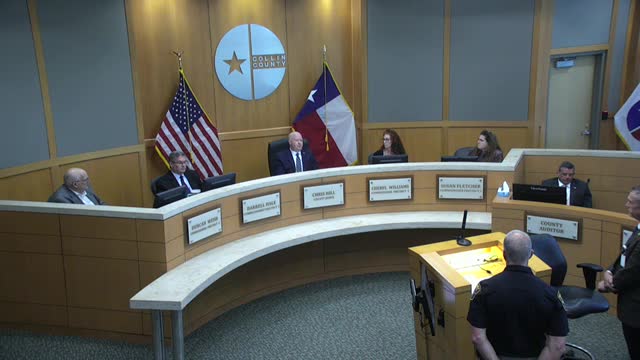Budget Workshop Highlights Staffing Needs and Accountability for Detention Facility Operations
July 28, 2025 | Collin County, Texas
This article was created by AI summarizing key points discussed. AI makes mistakes, so for full details and context, please refer to the video of the full meeting. Please report any errors so we can fix them. Report an error »

The Collin County Commissioners Court convened on July 28, 2025, to address pressing issues regarding the county's detention facilities and budgetary constraints. The meeting focused on the need for improved communication and accountability in managing overtime costs and staffing levels within the Sheriff's Office.
The discussion began with a recognition of the importance of flexibility in staffing to meet operational needs. One commissioner emphasized that while adjustments in personnel assignments are necessary, they must remain within budgetary limits. The need for accountability was underscored, particularly regarding financial management, as the county cannot increase taxes mid-year.
A significant portion of the meeting was dedicated to the ongoing challenges related to overtime expenses. The Sheriff's Office presented a budget adjustment aimed at addressing overtime costs, highlighting the necessity for formal requests during budget workshops to ensure clarity and prevent miscommunication. The commissioners expressed frustration over past practices that lacked detailed justification for staffing needs, which contributed to ongoing overtime issues.
The conversation shifted to the staffing levels required to manage detention effectively. It was noted that despite adding new personnel in previous years, overtime and comp time had not decreased as anticipated. The commissioners discussed the need for a thorough analysis of staffing requirements, suggesting that hiring additional detention officers could potentially reduce reliance on overtime.
The meeting also touched on the financial implications of housing inmates, particularly concerning medical costs associated with out-of-county placements. The commissioners raised concerns about the rising expenses related to inmate healthcare and the need for a comprehensive understanding of these costs to inform future budget decisions.
As the meeting progressed, the commissioners acknowledged the upcoming changes in state law that would impact the detention process, particularly regarding the transport of inmates for court appearances. This change could necessitate additional staffing and resources, further complicating the budgetary landscape.
In conclusion, the meeting highlighted the critical need for improved communication, detailed budget requests, and strategic staffing solutions to manage the county's detention facilities effectively. The commissioners agreed to continue discussions on these topics in future meetings, emphasizing the importance of fiscal responsibility and operational efficiency in the face of growing demands on the county's resources.
The discussion began with a recognition of the importance of flexibility in staffing to meet operational needs. One commissioner emphasized that while adjustments in personnel assignments are necessary, they must remain within budgetary limits. The need for accountability was underscored, particularly regarding financial management, as the county cannot increase taxes mid-year.
A significant portion of the meeting was dedicated to the ongoing challenges related to overtime expenses. The Sheriff's Office presented a budget adjustment aimed at addressing overtime costs, highlighting the necessity for formal requests during budget workshops to ensure clarity and prevent miscommunication. The commissioners expressed frustration over past practices that lacked detailed justification for staffing needs, which contributed to ongoing overtime issues.
The conversation shifted to the staffing levels required to manage detention effectively. It was noted that despite adding new personnel in previous years, overtime and comp time had not decreased as anticipated. The commissioners discussed the need for a thorough analysis of staffing requirements, suggesting that hiring additional detention officers could potentially reduce reliance on overtime.
The meeting also touched on the financial implications of housing inmates, particularly concerning medical costs associated with out-of-county placements. The commissioners raised concerns about the rising expenses related to inmate healthcare and the need for a comprehensive understanding of these costs to inform future budget decisions.
As the meeting progressed, the commissioners acknowledged the upcoming changes in state law that would impact the detention process, particularly regarding the transport of inmates for court appearances. This change could necessitate additional staffing and resources, further complicating the budgetary landscape.
In conclusion, the meeting highlighted the critical need for improved communication, detailed budget requests, and strategic staffing solutions to manage the county's detention facilities effectively. The commissioners agreed to continue discussions on these topics in future meetings, emphasizing the importance of fiscal responsibility and operational efficiency in the face of growing demands on the county's resources.
View full meeting
This article is based on a recent meeting—watch the full video and explore the complete transcript for deeper insights into the discussion.
View full meeting
